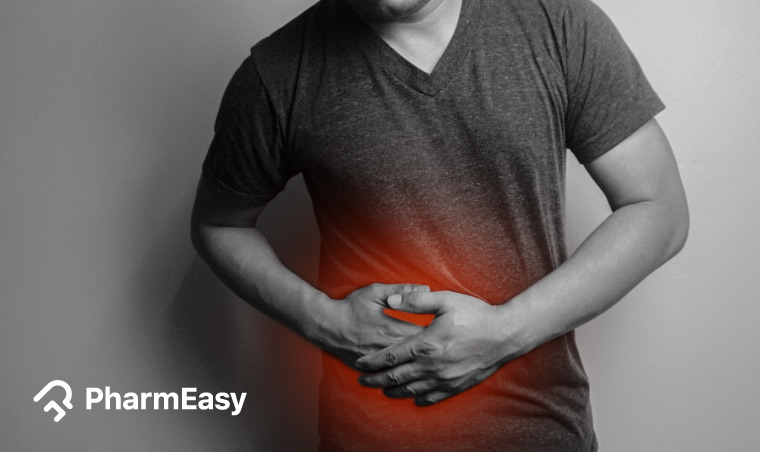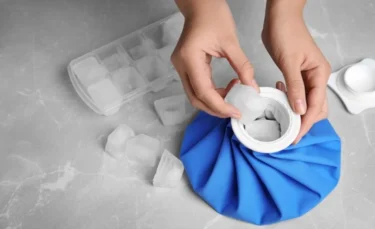The Best Home Remedies For Hernia
By Dr. Kundan Kharde +2 more

Get,

to manage your symptom
Get your,


4 Cr+ families
benefitted

OTP sent to 9988776655



You’ve successfully subscribed to receive
doctor-approved tips on
Whatsapp

Get ready to feel your best.

Hi There,
Download the PharmEasy App now!!


Register to Avail the Offer
Send OTPBy continuing, you agree with our Privacy Policy and Terms and Conditions

Hi There,
Sign up on PharmEasy now!!
Trusted by 4 crore+ families

OTP sent to 9988776655



You have unlocked 25% off on medicines




Code: NU25
By Dr. Kundan Kharde +2 more
Table of Contents
Hernia is a condition that occurs when an internal organ or tissue pushes through a weak spot or region in the covering muscle or tissue that is supposed to contain it. For example, one of the most common types of hernias is when the intestines (internal organs) push through the lower abdominal muscle wall (surrounding tissue). This produces a bulge in the lower abdominal area1.
A hernia may not be serious immediately, but many hernias tend to worsen with time and will require surgical intervention. Anybody can get a hernia regardless of age or gender, although it may be more common in older adults and those who are overweight. Most hernias occur within the abdominal cavity, between the chest and the hip.

It produces a noticeable lump or bulge that can be pushed back in or that can disappear when lying down. Laughing, crying, coughing or straining during a bowel movement or physical activity may make the lump reappear after it has been pushed in. Speak with a doctor immediately for an appropriate diagnosis.
A hernia can be caused by several reasons. The weakening of the enveloping tissues or other muscles due to ageing, strain, obesity, or birth defects can make it easier for internal organs to push through1.
Risk factors for hernia may also include pregnancy, being overweight, straining when going to the toilet, forceful and regular coughing, or giving birth. Additionally, some hernias may be caused after a surgical procedure, while other hernias, such as hiatal hernias, do not have causes that are fully understood.
This is the most common hernia. The inguinal canal goes from the abdominal region to the lower groin. The weakening of tissues in this region may cause the intestines or tissue from inside to push through and create a bulge at the top of the inner thigh2.
A femoral hernia is a rare type of hernia in the groin region that occurs over the femoral canal in the upper thighs. This type of hernia is more likely in older women3.
When the tissues or muscles near the belly button (navel) become weakened, the internal tissue can push through and make a bump in that area. This is known as an umbilical hernia. If the hernia is detected above the navel but below the breastbone, it is known as an epigastric hernia. This hernia may be noticed more often in young children4.
Inside your body, your digestive organs, like the intestines, are kept separated from the upper chest cavity due to the diaphragm. The diaphragm is a muscle within your chest that keeps the organs separate and organised, but sometimes the diaphragm can become weakened, damaged or have defects from birth. This leads to parts of the stomach pushing through and entering your chest region, known as a hiatal hernia. In some people with severe defects, not only the stomach but multiple organs from the tummy region are free to push into the chest area. This is called a diaphragmatic hernia5.
Incisional hernias occur at the site of an incision or cut, usually made for surgical purposes. After the surgery, the body may not heal the muscle tissue properly, which may lead to a weak point developing. This makes it easier for a bulge to form and the internal organs to push through. Some types of incisional hernias are called ventral hernias6.
Avoiding too much straining of your abdominal muscles after abdominal surgery and allowing your muscles to heal completely goes a long way to prevent the development of a hernia.
Dr. Ashish Bajaj, M.B.B.S., M.D. in Clinical Pharmacology and Toxicology
A hernia can be easily noticed since they typically occur in common places and have similar symptoms. In most cases, you will need to speak with your doctor immediately after finding a hernia. Here are a few key signs to watch for:
Hernia home remedies do not cure a hernia. But they may help reduce the risk of hernia in some people. Consult a doctor for proper diagnosis and treatment of a hernia.
Do not try any exercise or home remedies without your doctor’s consent.

One of the main causes of hernia is strenuous exercise or overexertion. If you are engaged in heavy exercises, cut back and perform easy workouts. People who have suffered from hernia before should refrain from lifting heavy weights7. Some of the following exercises can help reduce the hernia:

Light cycling may be considered safe for people with smaller hernias and may also strengthen your muscles. If cycling is causing you more pain, then it should be avoided completely.

Walking is one of the most beneficial and simple exercises to perform and comes with many health benefits. Walking will generally not put additional strain on your hernia, depending on where it is.

Swimming can relieve a lot of pressure, strain, and pain due to the buoyancy of the water. Speak with your doctor and find out whether this exercise is appropriate for you. You will need to avoid strenuous laps and focus on gentle pool wading to get any benefit from this exercise.

Yoga may also support abdominal muscle strength, similar to the previously mentioned abdominal exercises. Avoid any yoga poses that increase your pain and discomfort, as this may worsen your hernia.

Smaller meals can be effective in decreasing the symptoms associated with hernias that involve the intestines. The less pressure you put on your stomach internally, the easier it is for you to digest your food. This will ensure that your digestive system is not under stress, which may benefit you by limiting your hernia pain.

One of the simple natural remedies for hernia is using an ice pack8 as it act as a quick inflammation reliever when your hernia is causing too much discomfort. Always cover the ice with a soft cloth and do not leave it on for long periods.

With more fibre, your stools will be easier to pass and you won’t need to strain. Softer stools can also decrease the risk of constipation.

Obesity and being overweight may increase your risk of a hernia or worsen your condition if you already have one. The more you weigh, the more pressure is placed against your muscle walls. Speak with your doctor about safe ways to lose weight9. While some people may look for hernia treatment at home, it’s important to understand that such cases often require medical attention.
Home remedies for hernia only help in strengthening the muscles and preventing repeat herniation post-surgery. Surgery is the primary treatment for hernia.
Dr. M.G. Kartheeka, MBBS, MD(Pediatrics)
Also Read: Home Remedies for Jaundice By Dr. Siddharth Gupta
If your hernia is not causing you any symptoms like pain or bowel issues, your doctor may not immediately recommend surgery. However, in most cases, a hernia will be accompanied by several serious symptoms that require immediate medical attention. Consult a doctor if you notice the following:
Hernias usually become larger and more severe with time. A strangulated hernia is when the hernia bulge cannot be pushed back inside and becomes trapped within the muscles. This is a dangerous complication. Most hernias are surgically fixed by putting the internal organ back in its place and then strengthening the weak or damaged muscle tissue. Do not delay treatment.
Also Read: 8 Best Home Remedies For Piles
If you suspect that you might have a hernia, speak with your doctor immediately. Even if you do not yet have any hernia symptoms, your doctor will need to monitor your situation and plan for your future. Hernias can be extremely painful to manage and live with. Luckily, there are several surgical options available. Be sure to check with your doctor what instructions you need to follow to manage your hernia before and after surgery.
Also Read: Food Choices for Hernia: What to Eat and Avoid
Most hernias occur due to a combination of two factors occurring at the same time: internal pressure of the organs and tissues and the weakening or opening of muscles or other tissues. This leads to the internal tissue pushing through the outer protective layers and creating a bulge that is easily visible.
The first signs of a hernia are usually a bulge, swelling or bump in the belly, upper and inner thighs, or upper groin that is accompanied by sharp pain in some cases.
A hernia is usually a serious issue unless it is small. Even small hernias eventually turn into serious medical conditions; however, larger ones typically require urgent medical attention and will have more painful symptoms.
No, most hernias do not go away on their own and will require some kind of medical attention eventually.
Hernia often requires surgery to prevent complications such as strangulation or obstruction, but some cases can be managed non-surgically depending on the type, size, and symptoms. Consulting a healthcare professional is essential for an accurate diagnosis and treatment plan.
Yes, hernias can cause pain, especially when the affected area is under strain or pressure. The pain can vary from a dull ache to a sharp, intense discomfort, and it may worsen with activities like lifting, coughing, or bending.
Yes, hernias can cause constipation, particularly if they obstruct part of the intestine. This can lead to difficulty passing stool, abdominal bloating, and discomfort. If you experience these symptoms, it’s important to seek medical advice.
Yes, hernias can affect pregnancy. The increased pressure in the abdomen during pregnancy can exacerbate an existing hernia or contribute to the development of a new one. It is important for pregnant women with hernias to consult their healthcare provider for appropriate management and monitoring.
Hernias typically do not directly cause weight loss. However, if a hernia leads to complications such as intestinal obstruction or severe pain, it may result in reduced appetite or difficulty eating, which could contribute to weight loss. It’s important to seek medical advice if you experience unexplained weight loss along with hernia symptoms.
A hernia occurs when an internal organ or tissue pushes through a weak spot or tear in the surrounding muscle or connective tissue. This can be caused by factors such as heavy lifting, chronic coughing, obesity, or strain during bowel movements.
A hernia often feels like a noticeable lump or bulge in the affected area, which can be accompanied by discomfort or pain, especially when lifting, bending, or coughing. The pain can range from a dull ache to a sharp, severe sensation.
Hernias can sometimes be managed without surgery through lifestyle changes, such as avoiding heavy lifting and maintaining a healthy weight, or using supportive devices like trusses. However, surgery is often recommended to prevent complications and provide a definitive solution.
Yes, hernias can recur even after surgical repair. Factors such as the strength of the repaired area, the patient’s overall health, and postoperative activities can influence the likelihood of a hernia reoccurring.
Hernias themselves do not cause cancer. However, in some cases, a hernia may obscure an underlying tumour or cancerous growth, leading to delayed diagnosis. It’s important to consult a healthcare professional if you notice any unusual symptoms or changes in the area of a hernia.
While hernias themselves are not typically life-threatening, complications such as strangulation or obstruction, where blood supply to the herniated tissue is cut off, can be serious and even life-threatening if not treated promptly. Seeking medical attention for symptoms of a hernia is important to prevent complications.
There can be a genetic component to hernias, as certain inherited factors may predispose individuals to weakened abdominal muscles or connective tissues, increasing the risk of developing a hernia. However, lifestyle factors such as heavy lifting, obesity, and chronic coughing also play significant roles.
While hernias primarily manifest as a noticeable lump or bulge in the abdomen, they can sometimes cause referred pain, including back pain. This may occur if the herniated tissue presses on nerves in the abdomen or affects the alignment of the spine, leading to discomfort in the back or surrounding areas.
A hernia cannot be completely cured naturally, but certain lifestyle changes may help manage its symptoms and prevent it from worsening. Maintaining a healthy weight, avoiding heavy lifting, eating a fiber-rich diet, and practicing gentle exercises can reduce strain on the abdominal area. However, medical consultation is essential, as surgery is often the only effective treatment for a hernia.
1. InformedHealth.org [Internet]. Cologne, Germany: Institute for Quality and Efficiency in Health Care (IQWiG); 2006-. Overview: Hernias. [Updated 2023 Dec 13]. Available from: https://www.ncbi.nlm.nih.gov/books/NBK395554/
2. Hammoud M, Gerken J. Inguinal Hernia. [Updated 2023 Aug 8]. In: StatPearls [Internet]. Treasure Island (FL): StatPearls Publishing; 2025 Jan-. Available from: https://www.ncbi.nlm.nih.gov/books/NBK513332/
3. Goethals A, Azmat CE, Adams CT. Femoral Hernia. [Updated 2023 Jul 31]. In: StatPearls [Internet]. Treasure Island (FL): StatPearls Publishing; 2025 Jan-. Available from: https://www.ncbi.nlm.nih.gov/books/NBK535449/
4. Holt AC, Bamarni S, Leslie SW. Umbilical Hernia. [Updated 2024 Feb 27]. In: StatPearls [Internet]. Treasure Island (FL): StatPearls Publishing; 2025 Jan-. Available from: https://www.ncbi.nlm.nih.gov/books/NBK459312/
5. Smith RE, Sharma S, Shahjehan RD. Hiatal Hernia. [Updated 2024 Jul 17]. In: StatPearls [Internet]. Treasure Island (FL): StatPearls Publishing; 2025 Jan-. Available from: https://www.ncbi.nlm.nih.gov/books/NBK562200/
6. Hope WW, Tuma F. Incisional Hernia. [Updated 2023 Jun 12]. In: StatPearls [Internet]. Treasure Island (FL): StatPearls Publishing; 2025 Jan-. Available from: https://www.ncbi.nlm.nih.gov/books/NBK435995/
7. Pathak S, Poston GJ. It is highly unlikely that the development of an abdominal wall hernia can be attributable to a single strenuous event. Ann R Coll Surg Engl. 2006 Mar;88(2):168-71. doi:10.1308/003588406X95093. PMID: 16551411; PMCID: PMC1964073. Available from: https://www.ncbi.nlm.nih.gov/pmc/articles/PMC1964073/
8. Koç M, Tez M, Yoldaş O, Dizen H, Göçmen E. Cooling for the reduction of postoperative pain: prospective randomized study. Hernia. 2006 Apr;10(2):184-6. doi:10.1007/s10029-005-0062-2. Epub 2006 Jan 24. PMID: 16432641. Available from: https://pubmed.ncbi.nlm.nih.gov/16432641/
9. Dietz UA, Kudsi OY, Gokcal F, Bou-Ayash N, Pfefferkorn U, Rudofsky G, Baur J, Wiegering A. Excess body weight and abdominal hernia. Visc Med. 2021 Aug;37(4):246-253. doi:10.1159/000516047. Epub 2021 Apr 28. PMID: 34540939; PMCID: PMC8406351. Available from: https://www.ncbi.nlm.nih.gov/pmc/articles/PMC8406351/
Disclaimer: The information provided here is for educational/awareness purposes only and is not intended to be a substitute for medical treatment by a healthcare professional and should not be relied upon to diagnose or treat any medical condition. The reader should consult a registered medical practitioner to determine the appropriateness of the information and before consuming any medication. PharmEasy does not provide any guarantee or warranty (express or implied) regarding the accuracy, adequacy, completeness, legality, reliability or usefulness of the information; and disclaims any liability arising thereof.
Comments

Leave your comment...
You may also like
Comments